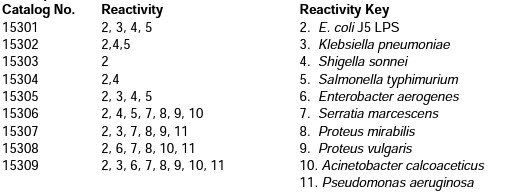Anti-Endotoxin Antibody (15307)
Anti-Endotoxin Antibody (15307)
Product No.: 15307
- -
- -
Clone HEC10-172.5 Target Endotoxin Formats AvailableView All Product Type Monoclonal Isotype Mouse IgM Applications ELISA |
Data
- -
- -
Antibody DetailsProduct DetailsReactive Species E. Coli J5, K. Pneumoniae, S. Marcescens, P. Mirabilis, P. Vulgaris, Ps Aeruginosa Host Species Mouse Immunogen E. coli O111 B4 J5 cells Product Concentration Lot Specific Formulation This monoclonal antibody is formulated in phosphate buffered saline (PBS) pH 7.2 - 7.4 with no carrier protein or preservatives added. State of Matter Liquid Product Preparation Antibodies are purified by a multi-step process including the use of PEG purification chromatography. Storage and Handling Upon initial thawing, appropriately aliquot and store at -80°C. For long-term storage, keep at -80°C. Avoid repeated freeze-thaw cycles. Country of Origin USA Shipping Next Day 2-8°C Applications and Recommended Usage? Quality Tested by Leinco These antibodies have been qualified for use in ELISA to detect gram-negative endotoxin and in dot-blots to detect cells that express gram negative endotoxin.
End users should determine optimal concentrations for their applications. Customer feedback: #15305 was conjugated to colloidal gold and used successfully in a lateral flow assay format. Each investigator should determine their own optimal working dilution for specific applications. See directions on lot specific datasheets, as information may periodically change. DescriptionDescriptionSpecificity Mouse Monoclonal Antibody specific to Endotoxin (See Reactivity Key). Background Endotoxin is the lipopolysaccharide (LPS) complex associated with the outer membrane of Gram-negative bacteria such as Escherichia coli, Salmonella, Shigella, Pseudomonas, Neisseria, Haemophilus influenzae, Bordetella pertussis and Vibrio cholerae. Toxicity is associated with the lipid component (Lipid A) and immunogenicity is associated with the polysaccharide components. The cell wall antigens (O antigens) of Gram-negative bacteria are components of LPS. LPS elicits a variety of inflammatory responses, and it activates complement by the alternative (properdin) pathway. Research Area Infectious Disease References & CitationsTechnical ProtocolsCertificate of Analysis |
Formats Available
 Products are for research use only. Not for use in diagnostic or therapeutic procedures.
Products are for research use only. Not for use in diagnostic or therapeutic procedures.



